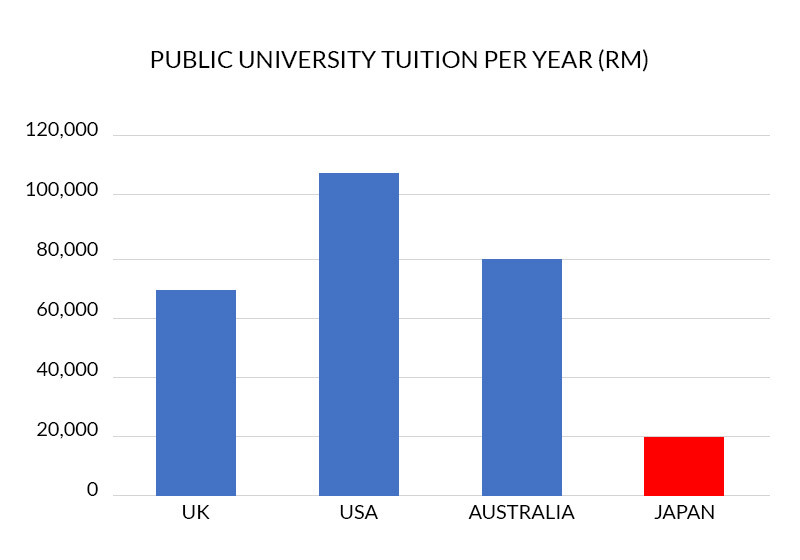FAQs
Regarding Pusat Bahasa Teikyo
Fundamentally, we offer two kinds of courses for preparatory studies to Japan: 12 Months Course and 20 Months Course. For people who are only interested in studying Japanese, the Japanese Language Specialized Course is available as well.
※We decided not to offer 12 months course for 2022. You may consider to join 20 months course which will start on April 2022.
※ We will reopen the 12-months course in 2023.
It is in January for the 12 Months Course and April for the 20 Months Course.
※We decided not to offer 12 months course for 2022. You may consider to join 20 months course which will start on April 2022.
※ We will reopen the 12-months course in 2023.
You must be a Malaysian National with 11 years (or more) of formal education. Besides that, there is a minimum grade to fulfill for SPM/IGCSE/GCE/O-Level/UEC holders.
Click here for "Application Guidelines"No, but you have to be at least 18 years of age by the time of admission into a University/College/Vocational School in Japan.
As long as you have completed the 11th year of the course, then yes, you can. However, please bear in mind that you have to be 18 years old by the time of admission into the University/College/Vocational School in Japan.
Yes, you can. Most students come in without prior experience in learning Japanese.
Your Japanese language ability will be assessed through our placement test before you are admitted into the course. Please feel free to contact us to schedule a test and counseling session.
| Q8 | Upon graduation, how does the level of Japanese differ between the 12 Months Course and 20 Months Course? |
As a reference, you would be at a level sufficient to pass the Japanese Language Proficiency Test (JLPT) N2 for the 12 Months Course; and N1 for the 20 Months Course. If you are planning to go for undergraduate studies in Japan, we highly recommend you to join the 20 Months Course.
| Q9 | Is it possible to study in the Science stream at the university if I was in Art stream at high school? |
We are very sorry to tell you that switching from art to science is impossible if you wish to study the sciences in university. The subjects of the university entrance examination are different for arts and sciences. At Pusat Bahasa Teikyo, there are also different entrance requirements for joining arts and science. If you are really interested in science, we recommend you to go to professional training colleges. However, the converse is possible.
| Q10 | Is it more advantageous for me to go to a Japanese Language school in Japan or Pusat Bahasa Teikyo? |
Our fees are cheaper compared to Japanese Language Schools in Japan and the study hours are longer for the other subjects (Maths, Physics etc.). This is advantageous if a person has completed Form 5 and aims to go to a national university.
Click here to see "Let's compare"Unfortunately, we only offer full time courses during daytime.
Most students go to school by LRT, KTM or bus. It is about 5 minutes on foot from the Mid Valley KTM station to the nearest bus stop.
No, you do not. It is included in the tuition fees.
We have a total of 8 weeks of school holiday in a year, including Chinese New Year and Hari Raya.
| Q22 | I am not sure which university/college I should go for in the future. Will I be given support in this matter? |
Regarding Further Studies to Japan
Generally, it takes 4 years for undergraduate degree, 2 years for master’s degree and 2 years for doctoral degree. As for professional training colleges, the courses are usually 2 or 3 years long.
First, you need to sit for the Examination for Japanese University Admission for International Students (EJU). After that, you will sit for the entrance examination of your chosen university.
The EJU Exam is an examination to assess the level of Japanese Language and other subjects (Mathematics, Chemistry, Physics, Japan and the World) of international students who wish to enter a Japanese University.
It is held twice a year (June and November), and there are various venues around the world. Our students sit for EJU in Kuala Lumpur.
| Q9 | After completion of Form 5, can I study at any Japanese Language school to enter a Japanese University? |
| Q10 | I have already completed 12 years of education. Is it possible to study abroad in Japan straightaway? |
If you have completed 12 years of formal education, you are eligible to apply to a Japanese University. However, you still need to acquire the Japanese language skills in order to comprehend the lessons. Also, if you need to sit for subjects such as Mathematics, Physics etc. in EJU, we kindly advise you to join our course.
When submitting the application, you will be asked to submit your high school’s (Form 4,5) results, but SPM results are not necessary. Generally, the high school results will not have any effect on your application. The acceptance is determined by your EJU results and the entrance examination results.
| Q13 | I heard that the tuition fees for Japanese universities are expensive, but how much do they cost approximately? |



